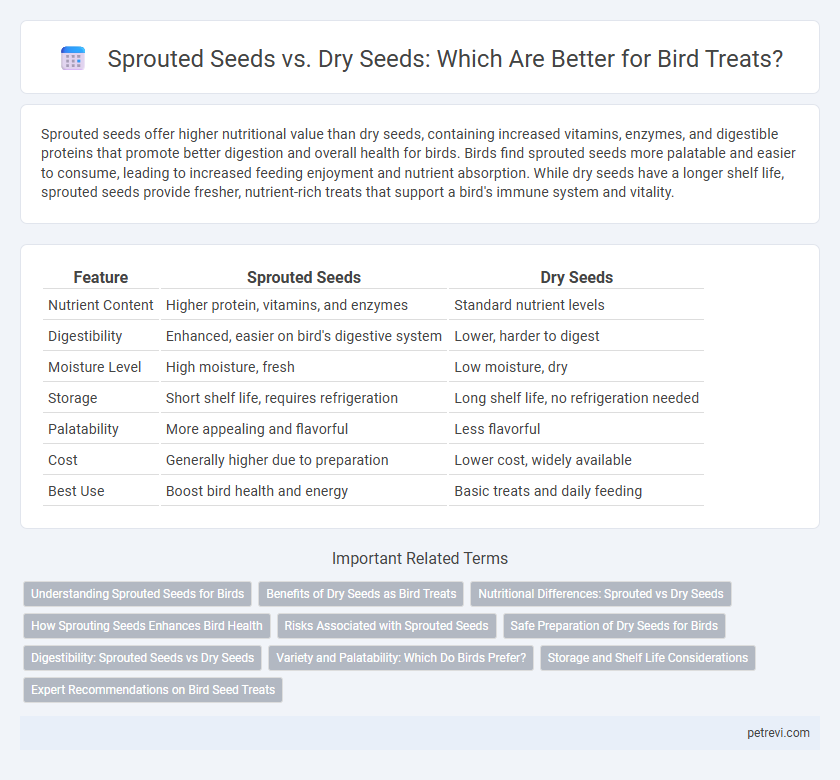Sprouted seeds offer higher nutritional value than dry seeds, containing increased vitamins, enzymes, and digestible proteins that promote better digestion and overall health for birds. Birds find sprouted seeds more palatable and easier to consume, leading to increased feeding enjoyment and nutrient absorption. While dry seeds have a longer shelf life, sprouted seeds provide fresher, nutrient-rich treats that support a bird's immune system and vitality.
Table of Comparison
| Feature | Sprouted Seeds | Dry Seeds |
|---|---|---|
| Nutrient Content | Higher protein, vitamins, and enzymes | Standard nutrient levels |
| Digestibility | Enhanced, easier on bird's digestive system | Lower, harder to digest |
| Moisture Level | High moisture, fresh | Low moisture, dry |
| Storage | Short shelf life, requires refrigeration | Long shelf life, no refrigeration needed |
| Palatability | More appealing and flavorful | Less flavorful |
| Cost | Generally higher due to preparation | Lower cost, widely available |
| Best Use | Boost bird health and energy | Basic treats and daily feeding |
Understanding Sprouted Seeds for Birds
Sprouted seeds provide enhanced nutritional benefits for birds, including increased enzyme activity, improved protein digestibility, and elevated levels of vitamins such as A, B, and C compared to dry seeds. The germination process reduces antinutritional factors, making sprouted seeds easier to digest and more bioavailable, which supports optimal bird health and energy. Offering sprouted seeds as treats promotes better immune function and encourages natural foraging behaviors, contributing to overall well-being.
Benefits of Dry Seeds as Bird Treats
Dry seeds provide excellent nutritional value for birds, offering a concentrated source of essential fats, protein, and carbohydrates that support energy and feather health. Their long shelf life and ease of storage make them a convenient treat option for bird owners, ensuring freshness and minimal spoilage. Compared to sprouted seeds, dry seeds are less prone to bacterial growth, supporting better digestive health and reducing the risk of mold-related illnesses in pet birds.
Nutritional Differences: Sprouted vs Dry Seeds
Sprouted seeds offer higher enzyme activity, increased vitamin content, particularly vitamin C and B-complex vitamins, and improved digestibility compared to dry seeds, which contain anti-nutrients that can inhibit nutrient absorption. Germination reduces phytic acid and tannins in sprouted seeds, enhancing mineral bioavailability essential for birds' growth and immune support. Dry seeds, while convenient and shelf-stable, lack these enhanced nutritional benefits and may contribute less to overall avian health and vitality.
How Sprouting Seeds Enhances Bird Health
Sprouted seeds offer higher nutritional value for birds compared to dry seeds by increasing levels of essential vitamins, enzymes, and antioxidants that aid digestion and boost the immune system. The sprouting process breaks down anti-nutrients like phytic acid, improving mineral absorption crucial for feather growth and overall vitality. Incorporating sprouted seeds into bird treats supports better gut health, energy metabolism, and enhances the bird's natural ability to thrive.
Risks Associated with Sprouted Seeds
Sprouted seeds pose risks for birds due to potential mold growth and bacterial contamination that can lead to digestive issues and infections. Unlike dry seeds, which have a longer shelf life and lower microbial risk, sprouted seeds require careful handling and timely consumption to prevent spoilage. Improperly sprouted seeds may harbor harmful pathogens such as Salmonella or Aspergillus, endangering bird health.
Safe Preparation of Dry Seeds for Birds
Safe preparation of dry seeds for bird treats involves thorough cleaning and soaking to remove dust, pesticides, and potential contaminants that can harm birds. Soaking dry seeds before offering them can enhance digestibility and reduce the risk of choking or digestive upset. Proper storage of dry seeds in a cool, dry place prevents mold growth, ensuring the treats remain safe and nutritious for bird consumption.
Digestibility: Sprouted Seeds vs Dry Seeds
Sprouted seeds offer enhanced digestibility compared to dry seeds due to the activation of enzymes that break down complex nutrients, making them easier for birds to absorb. The germination process reduces antinutrients such as phytates, which can inhibit mineral absorption in the digestive tract. As a result, sprouted seeds provide more bioavailable vitamins, minerals, and proteins, optimizing nutrient uptake and overall bird health.
Variety and Palatability: Which Do Birds Prefer?
Sprouted seeds offer enhanced variety and increased palatability compared to dry seeds, providing birds with a richer nutritional profile and more appealing texture. Birds tend to prefer sprouted seeds due to their higher moisture content and natural sweetness, which stimulate feeding behavior and improve intake. Incorporating sprouted seeds in bird treats promotes better health and encourages diverse foraging activities by mimicking natural diets.
Storage and Shelf Life Considerations
Sprouted seeds offer enhanced nutritional benefits for birds but require refrigeration and have a shorter shelf life of about 3-5 days due to moisture content. Dry seeds can be stored for several months in a cool, dry place, maintaining their freshness and preventing mold growth. Proper storage conditions significantly impact the quality and safety of bird treats, with dry seeds being more convenient for long-term use.
Expert Recommendations on Bird Seed Treats
Expert recommendations emphasize sprouted seeds over dry seeds for bird treats due to enhanced nutrient bioavailability and improved digestibility. Sprouted seeds contain higher levels of vitamins B and C, enzymes, and amino acids, promoting better bird health and immune support. Feeding sprouted seeds reduces the risk of mold and bacterial growth compared to dry seeds, making them a safer, more nutritious option for pet birds.
Sprouted seeds vs Dry seeds for Bird treats Infographic

 petrevi.com
petrevi.com